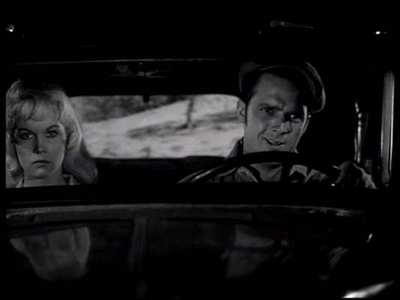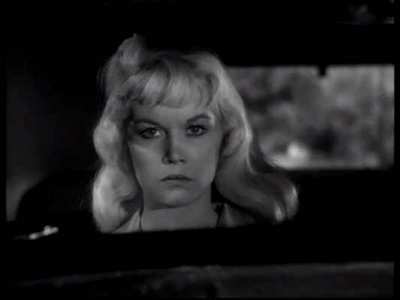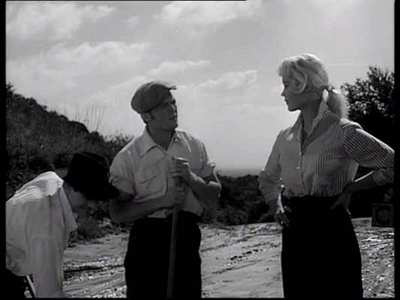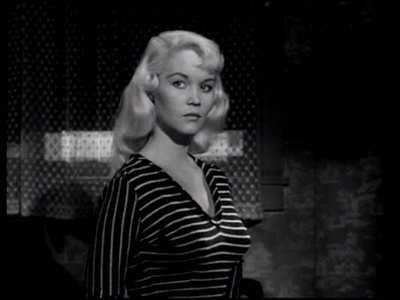Review of Bonnie Parker Story, The
Introduction
"The Bonnie Parker story" is a dynamite B-movie, and perhaps the finest release so far in this lack-lustre `library`. This is principally because of the electrifying performance and screen presence of Dorothy Provine. Man, she must have had those temperatures soaring in the late `50`s mixing, as she does here, wildcat rebellion with Bardot-like allure. She`s one hot chick - to use the vernacular of the time.
Of course, the producers knew they were on to a good thing with little-known Miss Provine, and this movie opens with a provocative scene of her undressing, apropos nothing - though she reverses the process once she reaches a negligee and quickly becomes fully clothed again. This is how she remains throughout, though an underlying steaminess and barely disguised sexuality permeates the remainder of the picture.
Legend has it that she landed the role just three days after arriving in Hollywood - and it`s easy to understand why. The camera loves her, and she has that indefinably unique quality that would have separated her from the countless other good-looking actresses of the time, as happened to Monroe and Bardot before her.
Having arrived in Hollywood at the height of the TV boom, she quickly became one of the most familiar faces of `50`s and early `60`s TV, becoming best known for her role as Pinky Pinkham, the jazzy, Charleston-dancing flapper in the Warner Brothers series "The Roaring Twenties." Movie fans of a certain age may recall her in `That Darn Cat!. She virtually retired from in front of camera-work in 1969, when she married director Robert Day, a UK born producer-director who cut his teeth on The Avengers, and Danger Man amongst others.
`The Bonnie Parker Story` is a hard-boiled pulp gangster flick, produced on a shoestring for the drive-in market, but like others that emerged from that ilk to greater import (like `Them!` for example), this movie is not half bad. From a gender-politics perspective, whilst there`s much to groan about in terms of Bonnie Parker`s glamorous demeanour, this is a great example of a lady taking control in a world full of exploitative men. This is the most literal example of `Grrrrl Power` that I`ve seen in a movie from this era and it`s note worthy that even the toughest of the tough become (metaphorically) emasculated at the hands of Ms. Parker. And she`s a cigar smoker too and you don`t see a dame do that too often!
It`s curious that, despite the fact that she leaves behind her a path of destruction and woe as a result of cold-blooded and merciless killing, we feel a modicum of sympathy for her. But these were moralistic times and despite a momentary glimpse at `what might have been` had she not set off on this endless crime-spree, the ending holds no surprises.
The dialogue is often tough, sharp and witty. There`s the portentous warning by a lecherous suitor: `You know as well as I do that you`ll end up on a street corner. And you won`t be selling no newspapers…". Another fine example is, a policeman asking: "Now where are you two going?". Their reply is typical pulp dialogue. "Wherever it is - you`re not invited." Rat-a-tat-tat-tat!! (That`s the Tommy-gun noise by the way…).
There`s also some neat Duane Eddy style guitar twanging in the soundtrack that faithfully evokes the era in which it was made. Despite the 1930`s setting, the clothes and hairstyles are pure 1950`s too.
It wasn`t until ten years later that the Beatty-Dunaway movie `Bonnie and Clyde` hit gold dust by re-telling this true-life crime tale in faithful 1930`s period style.

Video
As usual with these releases, no great shakes. It`s a 4:3 image although you never get the feeling that too much of the action is lost in the crop, though I also doubt that much careful panning and scanning went into the transfer. It`s not a bad print though and holds up pretty well with little fleck, grain or damage.

Audio
The audio is presented in standard mono, but is perfectly in keeping with the movie. It`s a good clean soundtrack with bright dialogue and an entertaining period score, with twanging guitars mixed into the orchestral washes.

Features
Oh, you know - that same audio only interview with Samuel Z. Ark off that appears on all these releases, which is diverting enough if you can be bothered. There are also trailers for some of the earlier schlock-horror releases in this collection. There are also Dutch subtitles, which are offered up as default. You have to actually go to the option to remove them - which leaves me thinking that there must be a big market in Holland for this type of drive-in movie.

Conclusion
This hard-boiled and tightly directed piece actually has more going for it than you might imagine. Despite the low budget, and the fact that this is another in a long line of `Arkoff Library` releases, this is actually a thoroughly enjoyable movie in its own right. It`s a tough tale well told, with some really sharp dialogue and action. It`s also a fascinating period piece, unusual for its time with its underlying theme of `girl power` and `sisters doing it for themselves`. But the real knockout feature of this movie is the inclusion of Dorothy Provine in the starring role. She oozes a heady mix of wildcat rebellion and barely suppressed sexuality and her on-screen presence is just electrifying. Despite the low budget realisation of the movie, and the low-budget transfer to DVD, there is much to recommend it.
Your Opinions and Comments
Be the first to post a comment!